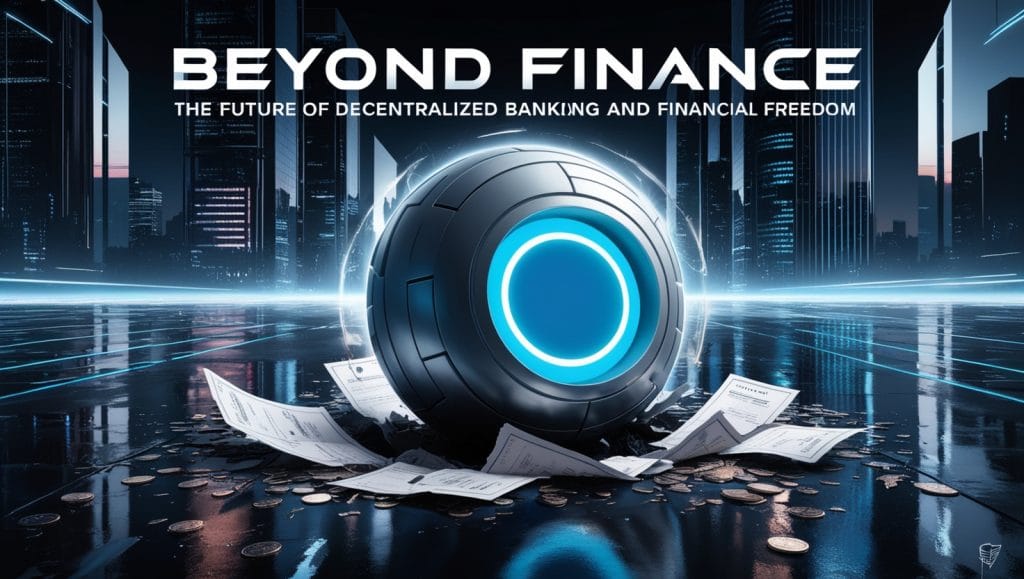Beyond Finance: The Future of Decentralized Banking and Financial Freedom-In recent years, the world of finance has been rapidly evolving, largely driven by the rise of blockchain technology and cryptocurrencies. While traditional banking systems have dominated for centuries, the concept of decentralized finance (DeFi) is gradually reshaping the financial landscape. The future of finance is no longer confined to banks and centralized authorities; it’s moving beyond finance. So, what does this mean for individuals and businesses alike? Let’s take a closer look at the emerging world of decentralized banking and financial freedom.
The Shift Towards Decentralized Banking

At its core, decentralized banking is about shifting away from traditional financial institutions such as banks, insurance companies, and brokers. Instead of relying on intermediaries to execute financial transactions, decentralized banking systems leverage blockchain technology to create trustless, peer-to-peer networks. This removes the need for central authorities and allows for direct interactions between users, providing more control over their finances.
This shift is a key element of what is being referred to as the future of finance, or Beyond Finance. DeFi platforms, powered by smart contracts and blockchain, are already offering innovative solutions to challenges faced by traditional banking, such as high fees, long processing times, and limited accessibility.
Key Advantages of Decentralized Finance (DeFi)

- Financial Inclusion
One of the most significant benefits of decentralized finance is the ability to provide financial services to anyone with an internet connection. For millions of people in developing countries who are excluded from the traditional banking system, DeFi platforms offer an alternative. With no need for intermediaries like banks, users can send and receive money, earn interest, and access loans without needing a credit score or a physical bank account.
- Lower Costs and Fees
Traditional banks and financial institutions often charge high fees for basic services, including international transfers, currency exchanges, and ATM withdrawals. With decentralized platforms, the absence of intermediaries means lower transaction fees. This not only reduces costs for consumers but also opens up opportunities for microtransactions and global remittances that were once prohibitively expensive. (Read More: How Finance Yahoo is Shaping the Future of Personal Finance Tools)
- Transparency and Security
Decentralized platforms are built on blockchain technology, which is transparent and immutable. Every transaction made on a blockchain is publicly recorded and cannot be altered, which helps prevent fraud and ensures that all participants can verify the integrity of the system. Moreover, blockchain’s encrypted nature makes it much more secure than traditional systems, where sensitive data can be vulnerable to hacks and breaches.
- Greater Control and Autonomy
For many, the idea of financial freedom comes with the ability to have more control over their assets. DeFi platforms allow users to hold their own private keys, meaning they have complete ownership of their funds without depending on a third party. This self-sovereignty gives individuals the freedom to make financial decisions on their own terms, without being subjected to arbitrary restrictions or regulations imposed by banks.
The Role of Cryptocurrencies in Decentralized Finance
Cryptocurrencies are central to the decentralized finance movement. Popular coins like Bitcoin and Ethereum have paved the way for the development of DeFi protocols. Through cryptocurrencies, users can trade, invest, and even earn passive income on decentralized exchanges (DEXs), participate in lending and borrowing platforms, or stake their assets to generate returns.
As the use of cryptocurrencies becomes more widespread, it is expected that they will play an even larger role in the Beyond Finance future. Their ability to function without a central authority and operate across borders makes them a powerful tool for promoting financial freedom and decentralization. (Read More: Top Finance Careers to Watch in 2024: Pathways to Success)
The Challenges of Decentralized Finance
While the potential for decentralized finance is immense, it also faces several challenges. One of the main obstacles is the lack of regulation. Without clear legal frameworks, many DeFi platforms operate in a grey area, which can discourage mainstream adoption. There’s also the issue of scalability. Current blockchain networks, such as Ethereum, often face congestion and high transaction costs during periods of heavy use.
Furthermore, decentralized platforms can be vulnerable to bugs and exploits. While the decentralized nature of these systems makes them resistant to censorship, they also expose users to the risk of losing funds due to smart contract errors or hacks. (Read More: How a Financial Institution Can Help You Achieve Financial Independence in 2024)
The Path Forward: How DeFi Can Evolve

Despite these challenges, the future of decentralized finance looks promising. Developers are continuously working on scaling solutions, such as Layer-2 protocols and interoperability between different blockchains, to overcome the limitations of current networks. Additionally, new regulatory frameworks are emerging that aim to protect consumers while allowing the DeFi space to thrive.
As awareness grows and more people understand the benefits of DeFi, we can expect greater collaboration between traditional financial institutions and the decentralized world. In the future, it’s likely that we’ll see hybrid systems that combine the best of both worlds—maintaining the stability and reliability of traditional banking with the freedom, efficiency, and transparency of decentralized platforms.
Conclusion article Beyond Finance: The Future of Decentralized Banking and Financial Freedom
Ultimately, Beyond Finance is about rethinking how we manage and interact with money. It’s about taking control of our financial futures and embracing systems that offer more autonomy, transparency, and security. The decentralization of finance is not just about cutting out the middleman; it’s about giving individuals and communities the tools they need to create a more inclusive, efficient, and open financial ecosystem.
The future of finance is being built today. As we continue to innovate, the boundaries of what’s possible will continue to expand, unlocking new opportunities for financial freedom across the globe. Whether you’re an investor, a developer, or just someone who wants more control over your money, the rise of decentralized banking is a step toward a future where finance truly belongs to everyone.











More Stories
Angel Investors What Is and Why It Matters
The Average Income from Airbnb: How Much Can Hosts Really Make?
6 Ways To Draw Lifetime Income From An Annuity